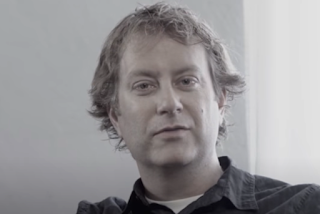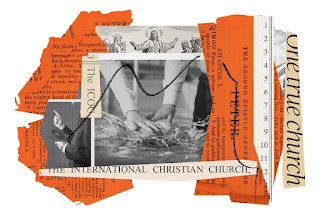There can be severe social consequences to leaving your religion behind, but many continue to do it, spurred on by a desire to live and learn independently. Taz Ali meets the people who’ve used their freedom from faith to discover themselves for the very first time – and often far later in life than the rest of us
Independent
July 31, 2025
Micki McAllen speaks matter-of-factly about all the times she was told the world was about to end. The September 11 attacks. Donald Trump’s election. Covid. Each time, she and her family – strict Jehovah’s Witnesses – would wait with a mix of dread and anticipation for the salvation to come. Of course, Armageddon didn’t arrive on any of those occasions. But McAllen was told to always be prepared – it was right around the corner, after all. It was only when she was 35, and first began questioning her faith, that she asked herself a simple question: why prepare to die when I could choose to live?
The pandemic was the final nail in the coffin for McAllen. Confined to her home during lockdown in Auckland, New Zealand, she found herself searching for answers online. Gradually, the doubt set in. “I started reading people’s experiences, especially going through Covid,” she says. “A lot of people were affected by not having to go to kingdom hall [a place of worship for Witnesses] or any meeting or field service. We all had time to slow down and to think.”
Witnesses who have left the organisation told me that abandoning or even questioning the faith has severe social consequences, particularly shunning. Driven by this fear, McAllen kept all “worldly” people – a term used by Witnesses to describe anyone outside of the religion – at arm’s length. But it did nothing to quell her desire to learn and think independently. “I want to be my authentic self, and have an authentic life,” she recalls saying to herself. “I don’t know who I am, but I want to begin and I want to figure this out.”
After just a weekend of poring over online forums and speaking to former Witnesses, McAllen decided to leave. Within a week, she had dyed her hair bright pink and began her dream career in dog grooming, something she says she would never have been able to do as a Witness, when she spent all of her free time preaching. The rest of her thirties were spent catching up on the firsts she'd missed in her teens and twenties, from late-night parties to first loves and even losing her virginity.
I knew I wasn’t a good Witness. So from a child I was like, ‘whenever Armageddon hits, I am done’. Also, I hated all the Witness boys, I hated this patriarchal idea of what they stood for. Hating men was a part of me - Sian Harper
“Being able to do that took some time,” she says. “It wasn’t until two years after I left [the religion] that I had sex for the first time. I was 37.” Up until that point, McAllen adds, she had only ever held a boy’s hand. “I was so nervous. My friends were like, ‘make sure he uses a condom, and that you pee after sex’ – bits of information that I had missed out on that most people know by now.”
McAllen, 39, who lives in Greenwich, south-east London, is today active in support groups that help people who leave high-control religious groups. She has also created a safe space online through her TikTok channel, Apostate Barbie, where she educates others about the realities of life as a Witness. A series of videos on “Random Things You Can’t Do as a Jehovah’s Witness” has amassed hundreds of thousands of views. “I try to keep things very factual and light,” she says of her content. “I don’t want it to be heavy or [involve] calling people names. I try to show that there is life after religion. That it’s not all doom and gloom, that we’re all happy and fine, and in fact life is better.”
Like a lot of ex-Witnesses, McAllen describes leaving the religion as “waking up”. She had devoted her entire life to the faith, attending regular meetings at kingdom hall and spending dozens of hours a week knocking on doors and handing out pamphlets.
Jehovah’s Witnesses are prohibited from socialising with nonbelievers, higher education is often discouraged to prioritise witnessing, and dating is strictly reserved for those seeking marriage. Former members say they were warned that questioning or leaving the faith could lead to “removal from the congregation”, a formal practice of excommunication that was, until recently, known as disfellowship.
A person who is disfellowshipped stands to lose everything. They are effectively shunned by the community and end up “grieving the living” after losing contact with family and friends. Nicolas Spooner, a counsellor who specialises in working with Jehovah’s Witnesses who leave the organisation, says exclusion from the faith can have a lasting negative impact on mental health, career prospects and quality of life, but it can also present an opportunity for self-discovery and new experiences that would change their lives completely.
“Looking at the sorts of things they’re finding out about themselves, I think mostly they’re starting to realise how many life skills they lack,” Spooner says. “This is what I hear more than anything else. It’s quite common for [former members] to find that they shy away from social situations, because they lack certain life skills that everybody else takes for granted – like how to make friends, how to treat friends, how to be a friend. These are things that we learn as we’re growing up. If you’re growing up as a Witness, it’s not the same.”
But it’s never too late to learn, he adds, as he points to his wife, Heather, who left the Jehovah’s Witnesses at the age of 48. Since then, she has completed a PhD in psychology researching the effects of religious ostracism, authored a number of academic articles on the subject and is a lecturer in psychology at Manchester University.
“She got her life back,” says Spooner, who met Heather a year after she left the Witnesses. “She reached the point where she had to say to herself, ‘they’ve had 48 years of my life, they’re not having any more’. The people that recover the best do inevitably have to get to that point… realising, ‘I left so that I could get my life back’.”
McAllen and other former Witnesses I’ve spoken to – all of whom have since come out as bisexual or gay – said the organisation initially gave them a sense of belonging, but proselytising left them with a feeling of vague disquiet. They would preach that God condemns homosexual acts, feelings and thoughts, a message that clashed with their own internal struggles about their sexuality.
“Leaving the religion and having time to figure out who I am and think about things I’ve never thought about, I realised I was bi,” says McAllen. “I got to talk to other people from the queer community and it was such a really nice, fun and creative environment.”
For some Witnesses, coming out can be a painful and terrifying ordeal. Ben Gibbons, 37, had been outed by another member of the organisation when he was in his early twenties. He was forced to attend Bible studies with an elder in the congregation for days on end and wasn’t allowed to leave his house without another member of the group present. Some of the practices he was subjected to were so extreme that he describes them as a form of gay conversion therapy. While the religion does not officially endorse the practice, its teachings can put strong pressure on LGBT+ members to suppress or reject same-sex attraction.
Gibbons says he was made to drink a bitter liquid to make himself sick every time he had an “impure” thought. “I was told how wrong it was, told to hide it, constantly read from the Bible,” he adds. “I used to bleach my hair and wore bright colourful clothes. By the end of it I had a shaved head, everything was monochrome, nothing too tight, all to make me look ‘straight’.”
It took years of therapy for Gibbons to be able to recover from the trauma, but he says he is now in a much happier place. He left the religion, married his partner, Lee, in 2022, and they live in the Norfolk town of Dereham, where Gibbons works as a wedding videographer.
When he talks about his past as a Witness, he says it feels almost otherworldly. “It was like I was in a PC game. The crowd filler, the random humans walking around the screen – that was me, because I couldn’t live authentically there. Leaving has allowed me to live a much freer life and do things that I otherwise wouldn’t have had a chance to do. If the younger me could see me now … the idea of being married, having a roof over my head, being free and OK with everything and now speaking out, I would never have believed it. That is my goal, to be the person that I needed back then.”
The fear of isolation leads many to live double lives, like Sian Harper, 28, a building manager in Oxford, who was born and raised a Jehovah’s Witness. She had friends outside of the organisation, and did just enough not to raise suspicion at her church. She later came out as lesbian, got engaged to a woman and told her family about her sexuality and intention to leave the religion, which they didn’t take well, although they admitted they had seen it coming. “I knew I wasn’t a good Witness,” Harper says. “So from a child, I was like, ‘whenever Armageddon hits, I am done’. Also, I hated all the Witness boys. I hated this patriarchal idea of what they stood for.” She laughs. “Hating men was a part of me.”
Like McAllen and Gibbons, Harper has little to no contact with her family today. While none of them has been formally disfellowshipped, they have taken the difficult decision to let go of their old lives and everyone in them in order to build new ones.
The relationship didn’t work out for Harper, but she allowed herself to heal and grow from the heartbreak. “We grew apart, unfortunately, but that’s OK. I hope that they continue to grow and I hope I do too. I am more open to new experiences, moving different places and not being worried that this is some kind of moral failing. I’m going to die either way – I might as well just have fun, go out and snog some girls.”







